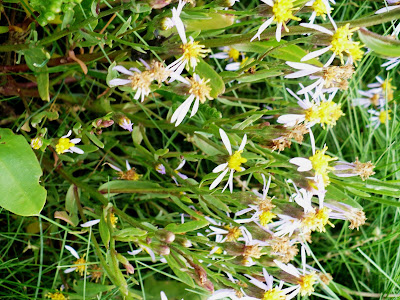This blog may help people explore some of the 'hidden' issues involved in certain media treatments of environmental and scientific issues. Using personal digital images, it's also intended to emphasise seasonal (and other) changes in natural history of the Swansea (South Wales) area. The material should help participants in field-based modules and people generally interested in the natural world. The views are wholly those of the author.
Tuesday, 10 September 2013
Saturday, 7 September 2013
The Fall and Fall of the Water Vole
present account suggests that numbers have declined by a further 20 percent and lays much of
the blame at the door of the alien North American mink (they seem to find Water voles both
delicious and easy to catch). I suspect that the picture is more complex as habitat degradation
must play a role and there are other carnivores out there including Grey heron and otters.
Friday, 6 September 2013
Thursday, 5 September 2013
Tuesday, 3 September 2013
Lake District Down the Plug Hole?
There is a somewhat jaundiced article by George Monbiot (http://www.theguardian.com/commentisfree/2013/sep/02/lake-district-wildlife-desert-blame-wordsworth) on yet another application from the Lake District to be granted UNESCO World Heritage Status. His basic point (for which I have a deal of sympathy) is that agriculture (in this case sheep farming on the hills) has largely created a 'wildlife desert' (although even 'deserts' benefit certain species). The sheep have certainly denuded the location of its original trees and most substantial plants (actions that would certainly make the area uninhabitable for many animal species). Monbiot freely admits that the Lake District is associated with some of the early enthusiasms for environmental issues but feels that the pastoral enthusiasms of Wordsworth and Ruskin were a result of looking at this world through rosé-tinted spectacles in their times. Hill farming, he points out, requires big subsidies and limits the numbers of people required (perhaps not wholly a bad thing?). Granting the location World Heritage Status would probably further fix things in aspic?
Monday, 2 September 2013
Ocean Hiatus
There is news (http://www.independent.co.uk/environment/climate-change/how-the-pacific-has-put-global-warming-on-hold-but-not-for-long-8788403.html) that global warming is occurring somewhat more slowly than anticipated by the computer models. This is thought to be due to the deep oceans absorbing some of the heat. The effect is, however, only likely to act for a short time and the precise consequences to climate change of changing the temperatures of deep waters are distinctly uncertain. I suspect that enthusiasts for non-renewables will try to use this information to deny that there is any real problem.
Subscribe to:
Posts (Atom)
Seeing the Changes 2183
Early ripening fruit may seem convenient but some folk think it confirms environmental stress. There's also a possibility th...

-
Early ripening fruit may seem convenient but some folk think it confirms environmental stress. There's also a possibility th...
-
It's necessary, where possible, to replace diesel and petrol-fueled vehicles by electrical equivalents. Electric vehicles (EVs) don...


+full+view.jpg)







%20mating%20NWCW.jpg)